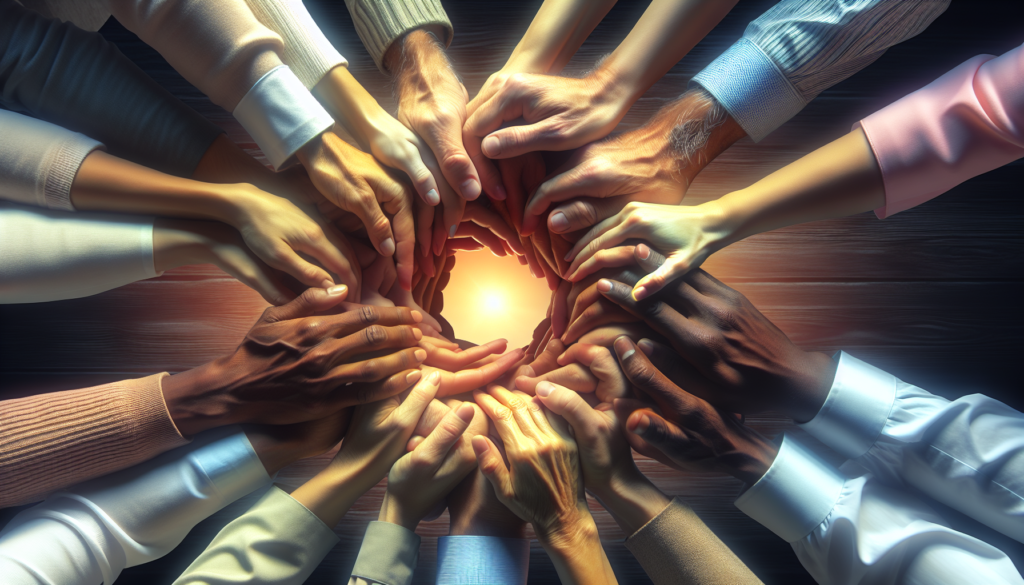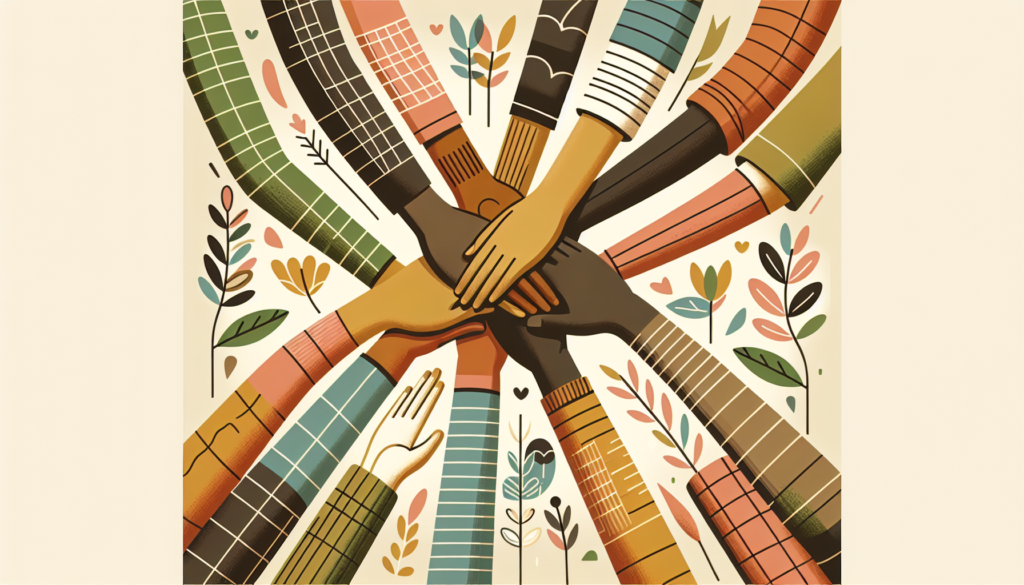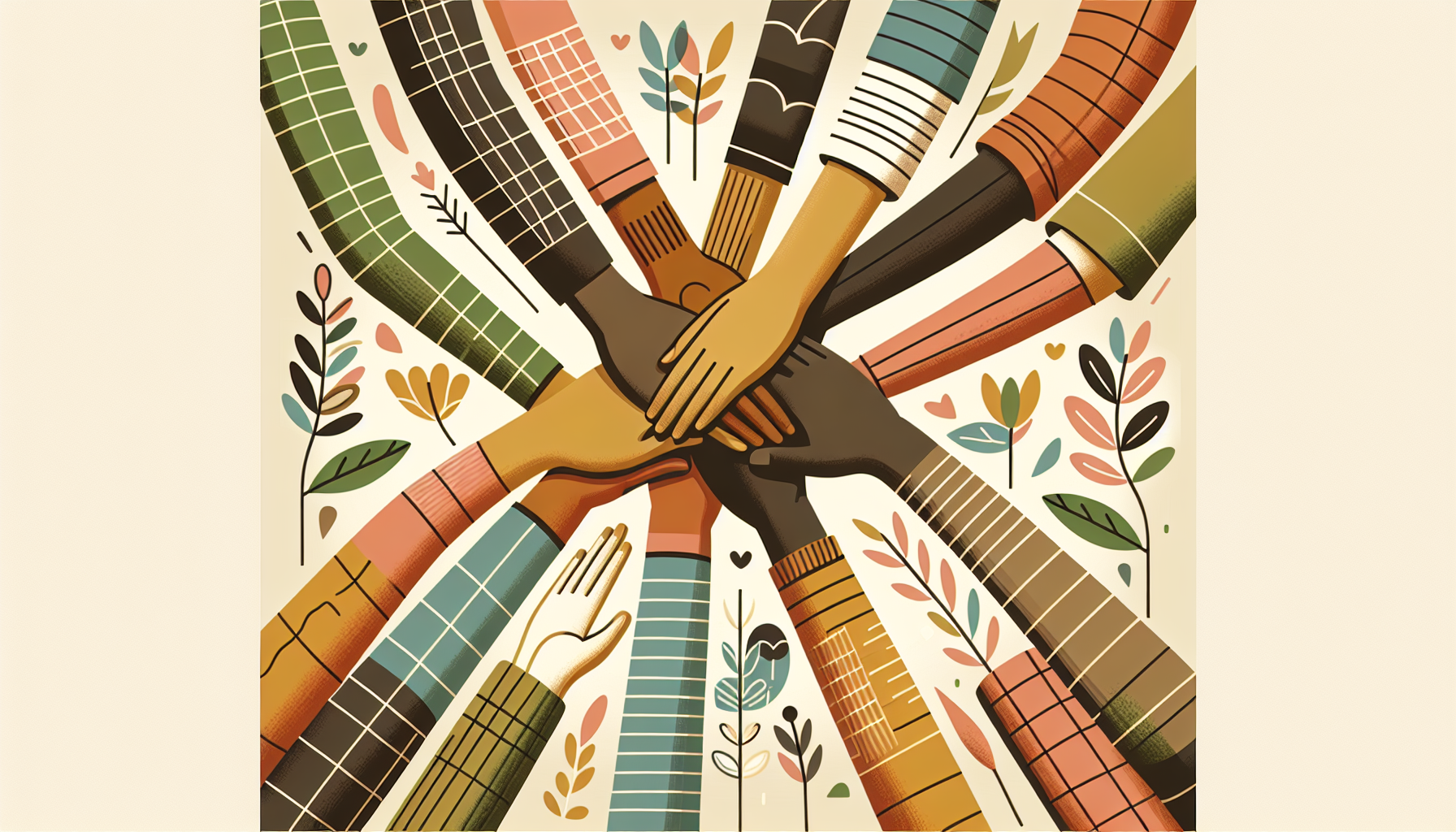Did you ever wonder why your treadmill ignores you when you try to share stories about your weekend? Or why your low-fat yogurt fails to bring you solace when you’re feeling blue? Sure, you’ve vowed to drink green juices, jog tirelessly, and karate-chop those extra pounds. But, guess what? Your health journey is a bit of a drama queen and likes a supportive entourage to keep the show running. And by entourage, I mean actual human beings—not cats, not the new self-aware smart fridge talking back, and certainly not your collection of fashionably dusty dumbbells.

Why Social Support is Your Health Journey’s Secret Ingredient
Before you embark on a lonely escapade to wellness-land, let’s take a moment to appreciate the one thing that might just bring your health journey to a happy ending—a social support system. Yes, having friends might not always help you remember where you left your keys, but they do play a pivotal role in keeping your health ship afloat.
The (Not-So) Secret Recipe for Success
Think of social support as the secret spice in the gourmet dish of your health quest. Too many of us think we have to go it alone, like some lone wolf in a dramatic survival film. But in reality, the wolf had a pack and probably a VIP pass to a health wolf spa. Your well-meaning friends, family, and community—essentially anyone who doesn’t actively avoid your calls—can provide motivation, advice, accountability, and perhaps an occasional judgment-free eye roll when they catch you trying to justify ketchup as a vegetable.
The Psychology of Support: Because Hugs Aren’t Just for Show
Let’s Get Technical for a Moment
Now, before you accuse me of being overly sentimental, let’s break this down into nerd-friendly psychology bits. When people have emotional support, their stress levels drop like a hot potato. This isn’t just some feel-good nonsense; science backs it up. When stress takes a nosedive, you’re able to make better decisions. Suddenly, salads look way more appealing than a potato chip buffet.
Your Emotional Crash Pad
Non-human companions are great and occasionally purr in synchronization with your heartbeat. However, they lack the one thing your human supporters can give—empathy and understanding. When you find yourself in the throes of a workout-induced identity crisis (“Am I a person who does squats now? Is kale my life?”), having people around who get it can make the difference between sticking it out or bailing on healthy habits faster than you can say “ice cream relapse.”
The Types of Social Support: Friends, Family, and the Random Guy at the Gym
Emotional Support: Tissues and Talk Therapy
This is the Sakura blossom of the support universe. Emotional support includes listening to your rants, offering a tissue when you insist you’ve sweat in your eyes during yoga, and giving pep talks worthy of a sports movie trilogy. This support is incredibly essential, especially on those days when your resolve wavers like Jell-O on a tectonic plate.
Instrumental Support: More Than Just Lending a Tractor
Imagine needing an extra pair of hands to prep those infuriating spiralized zucchinis or someone to lend you their blender for that kale smoothie (trust me, it’s better shared). Think of instrumental support as the practical, helping-hand variety. It involves tangible assistance like rides to appointments, picking up vitamins, or helping untangle earbuds when you’re about to leave for a run.
Informational Support: The Know-It-All’s Treasure Trove
Sometimes it’s good to throw down knowledge like you’re on a trivia game show. This is where informational support shines. It involves offering guidance, tips, and even suggesting vegan recipes that don’t make you wish for steak. Your friends might not be certified health experts, but their shared stories and researched facts certainly stack up to an impressive Wikipedia article.
Affirmational Support: You’re a Health Superhero and Everyone Knows It
Affirmational support is when your friends morph into cheerleaders. They won’t hold back when telling you how fabulous you look or congratulating you for running a mile without dramatically collapsing. These affirmations foster a sense of belonging and validate your efforts, proving crucially uplifting especially on struggle-filled days.
The Science of Social Support, AKA Why it Works Without Magic
Stress-Busting VIPs
In the grand hierarchy of stress busting, social support reigns supreme. When stress management is at an all-time high, others eagerly reminding you not to inhale an entire cake is buttressed by a buffer that can keep those cortisol levels behaving. Lower stress levels improve physical health, cut out the emotional binges, and prevent questionably impulsive decisions like signing up for extreme obstacle courses.
Enhanced Mental Well-Being
Having a squad amplifies happiness like an instant upgrade to first class on the airplane of life. Social connections are inherently rewarding, nurturing a feeling of satisfaction and well-being. And yes, that mental boost genuinely improves physical health by delaying aging (the power of love, people!) and lowering the risk of developing health issues like heart conditions, diabetes, or “doughnut-itis.”
Better Physical Health Outcomes
Research tantalizes us with the tantalizing possibility that those with stronger social networks tend to live longer, healthier lives. It’s not a trade-off for the eternally young; rather, those bonds reduce the risk of diseases and promote healthier behaviors. A friend who’ll walk with you is someone who’s literally along for the journey.

Cultivating Your Health Ecosystem: Starting Your Sassy Network
Befriend the Local Health Curious
Harnessing the power of extroversion and minimal awkwardness, engage with the folks you encounter at gyms, yoga studios, and that one neighbor determined to get into running despite suspicious huffing noises. Shared environments breed camaraderie, nurturing potential friendships.
Ask Not What Your Friends Can Do for You
Have a conversation with your inner introvert and ask, “What’s one small thing I can ask for help with?” Start small to ease into the practice of seeking support. Whether you need a taste tester for your newfound quinoa recipes or someone to keep you company during evening strolls, creating opportunities for others to lend a hand often reciprocates with enthusiastic support.
Family Ties that Strengthen
While family might sometimes seem to question your salad-to-steak ratio, they form an integral part of your support system. Try involving them through activities that extend beyond meal lectures. A weekend hike, family sports day, or even collectively learning a new healthy recipe can strengthen both familial and fitness bonds.
Yes, You Can Still be a Lone Wolf (with Benefits)
While some wolves enjoy isolation, the lone wolf life needn’t mean the life of the party-less. The good news is you can still have your well-adjusted health routine and eat kale chips too. Virtual communities offer bio-break friendly spaces where anonymity meets encouragement. Studies indicate that online groups can provide meaningful support without the risk of impromptu dinner parties ruining your TV binge plans.
Stay Realistic and Flexible
Internet friends, while decidedly less likely to catch you sneaking in midnight popcorn raids, won’t ask invasive questions about your life. Tailor your online involvement based on your preferences. Joining health forums, workout groups, or even wading through the depths of social media—ask, exchange, and learn.
Structure Your Digital Network
Designing a digital health playbook will enable you to be selective. Settling down with platforms that interest you can result in curated communities that offer expertise, emotional backing, and creative ideas. Stay open to comments, and don’t forget to reciprocate kindness. After all, support works best when it’s a two-way street.
Closing Thoughts: You, Your Health, and The Importance of Social Support
At the heart of this health odyssey lies one simple truth: you’re at your best when you know you’re not alone. Laden with uniquely human experiences and sprinkled generously with trials, your health quest needs more than determination. It requires support, laughter, and the occasional free pass for healthy sprees gone wrong. By reconnecting and establishing social threads, you can weave your way into a wellness fabric strengthened by unity.
So, next time your treadmill gives you the silent treatment, don’t take it to heart. Instead, call your workout buddy, join a new class, or even sway your neighbor into a tennis match, because it’s these human connections that genuinely matter. Let them share in the experience, add color to your story, and remind you that yes, in this chaotic parade of life, you’re perfectly capable of juggling dumbbells and friendships without missing a beat—or a two-step on your health journey.
